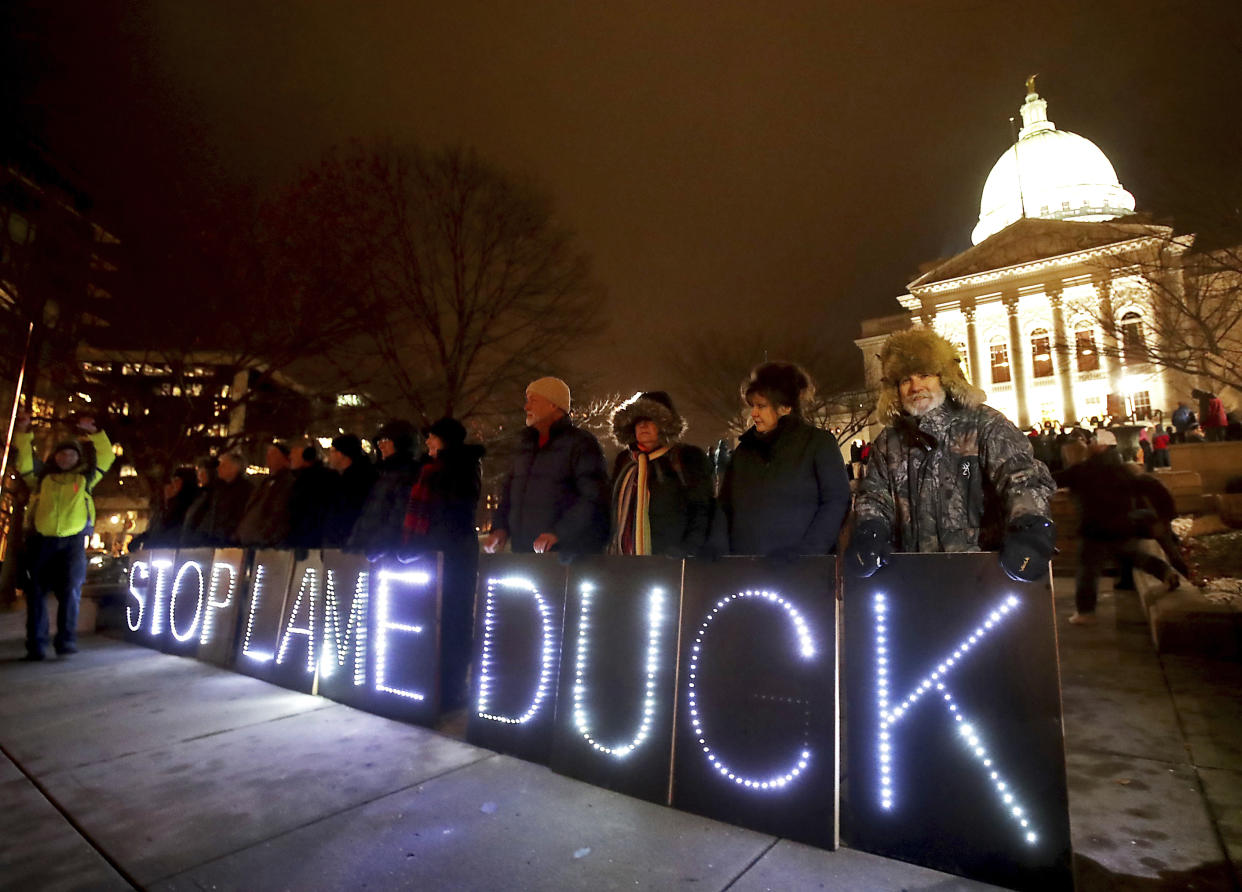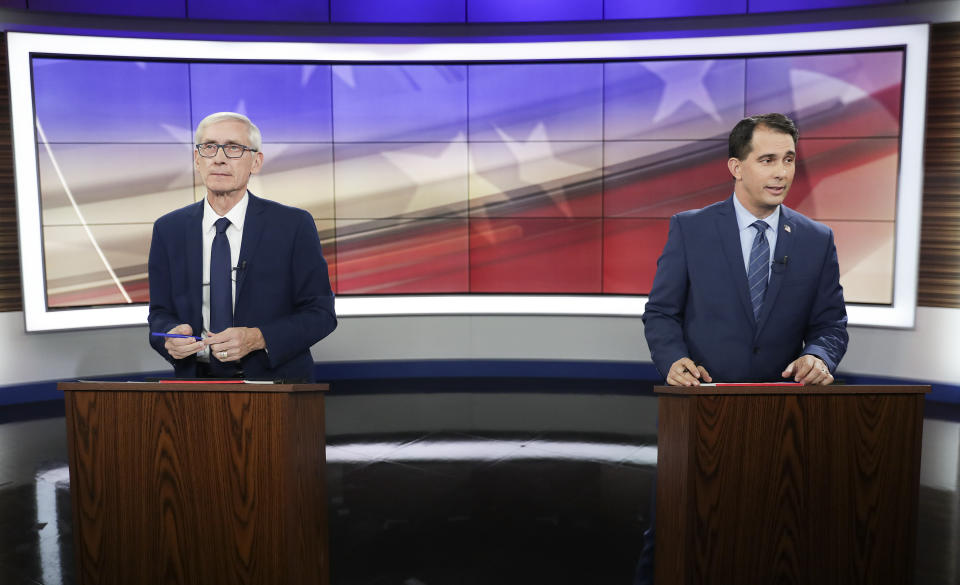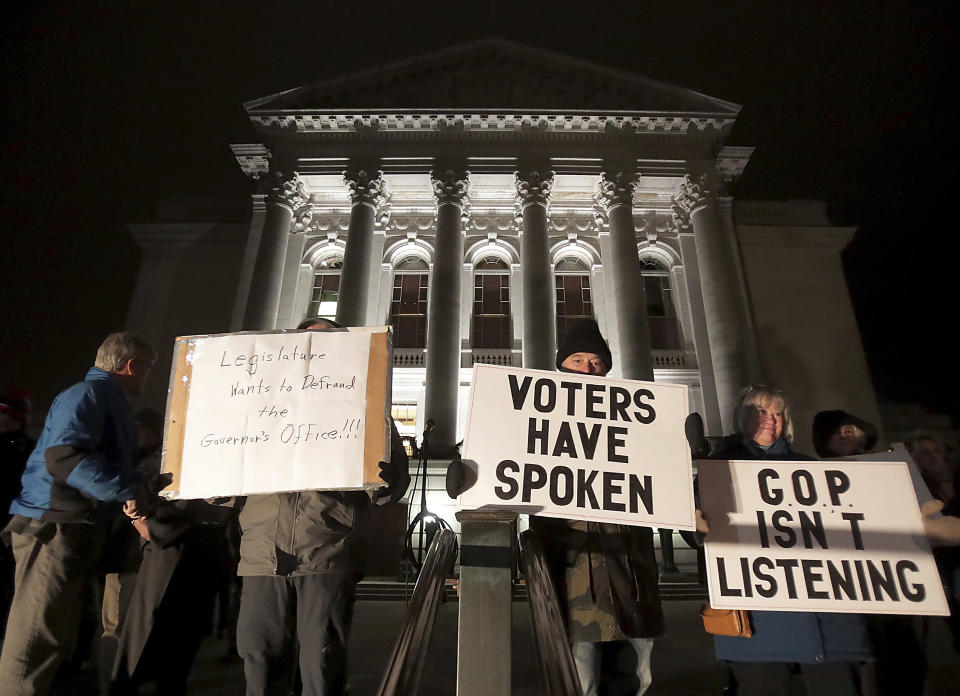Down but not out yet, GOP seeks to hamstring incoming Dem governors

Following Democratic successes in the midterm elections, Republican legislatures in Michigan and Wisconsin are looking to limit the power of incoming officials via lame-duck session power grabs.
On Wednesday morning, Republican legislators in Wisconsin passed legislation aimed at limiting the power of incoming Gov.-elect Tony Evers and Attorney General-elect Josh Kaul, both Democrats. It would move powers from the offices of the governor, such as control over a job-creation agency created by current Republican Gov. Scott Walker, to the state Legislature. It would also limit the discretion of the attorney general in deciding which litigation to pursue or defend, allowing the Legislature to overrule him and appoint its own counsel. (Evers and Kaul campaigned on withdrawing Wisconsin from a lawsuit against the Affordable Care Act.) They have also proposed reducing early voting even though a similar measure was deemed unconstitutional two years ago.
As he prepared to take office in 2010, Walker denounced the lame-duck session of the Democratic-controlled Legislature, but this time around, he defended the proposed legislation as “things that can be changed by the new Governor and Legislature.” Walker is expected to sign the legislation.
Robin Vos, the Republican Speaker of the state’s assembly, said Tuesday night that the measures were necessary because Evers was too liberal for the state that had just elected him. Without passing the bills, said Vos, “we are going to have a very liberal governor who is going to enact policies that are in direct contrast to what many of us believe in.”
Republicans will continue to control the Legislature, thanks to the gerrymandered districts they instituted. Democratic candidates received 190,000 more votes than their Republican counterparts, but the GOP retained 63 of the 99 state Assembly seats. Republicans have said that the legislation is simply an attempt to promote good governance, which has led Democrats to question why they waited until now — after their candidates lost the major statewide races — to institute these urgent reforms.

“The legislation before you today and the spirit of this extraordinary session are unfettered attempts to override and ignore what the people of Wisconsin asked for this November,” said Evers in written testimony to the state Senate regarding the lame-duck bills. “This is rancor and politics as usual. It flies in the face of democratic institutions and the checks and balances that are intended to prevent power-hungry politicians from clinging to control when they do not get their way.”
Said Kaul in a statement, “The authors of this bill seem to think that they know better than the voters of Wisconsin. They’re wrong. And that’s not how democracy works. I am calling on the members of the legislature to reject this horrible bill.”
The state Senate majority leader, Scott Fitzgerald, didn’t deny that the measures were a response to the changed political climate.
“Most of these items are things that either we never really had to kind of address because, guess what?” Fitzgerald said Monday in a radio interview. “We trusted Scott Walker and the administration to be able to manage the back-and-forth with the legislature. We don’t trust Tony Evers right now in a lot of these areas.”
On Tuesday, Republicans dropped a plan to move the state’s 2020 presidential primary, which would have likely aided a conservative state Supreme Court judge’s reelection effort. It was an odd day at the Capitol in Madison, as a Christmas tree-lighting ceremony and choir performance coincided with protesters pushing back against the Republican plan.

Similar efforts are being underway in Michigan, where Democrats won statewide races for governor, secretary of state and attorney general — all positions now occupied by Republicans. The changes under consideration would include a provision similar to the one proposed in Wisconsin, allowing the Legislature to determine which laws are defended in court and stripping power from the attorney general’s office. Another bill would shift election oversight from the secretary of state to an independent commission. Republicans in Michigan are also attempting to overturn the results of a ballot measure that would legalize marijuana, and tinker with the language of measures — also passed by referendum — that affect voting rights and the drawing of district lines.
In Ohio, the Republican-led legislature is attempting to make it harder for voters to pass constitutional amendments via the ballot. This May, Ohioans voted yes on redistricting reform, which would likely hurt GOP incumbents in the highly gerrymandered state.
These tactics have been deployed over the last two years in North Carolina, where the state’s Republican supermajority in the state legislature and incumbent GOP governor reacted to the election of Democrat Roy Cooper as governor in 2016 by passing legislation meant to limit his power once he took office. Via a series of lawsuits, Cooper has been able to claw some power back.

Jared Leopold, communications director for the Democratic Governors Association, said that their office is working with the incoming governors to help them navigate what he referred to as an “increasingly deliberate Republican strategy” to attempt to rewrite the rules following electoral losses. As Democrats attempt to win back governor’s mansions and state legislatures they lost during President Barack Obama’s tenure, it seems likely they could run into similar issues in ensuing elections. Leopold said most of the response has come at the state level, and pointed to the Tar Heel State as an example of potential consequences for other states trying these tactics.
“One of the things we saw in North Carolina is that it was a black mark for Republicans that cost them politically,” said Leopold. “They lost a number of seats in the Legislature this cycle in large part because of the feeling that the Legislature had broadly overreached.”
In North Carolina, Republicans lost their supermajority in both houses of the state Legislature as Democrats flipped 15 seats. With the ability to override Cooper’s vetoes expiring in a few weeks, GOP leaders have focused on pushing a new constitutional amendment through the lame-duck session that would require ID for voting.
_____
Read more from Yahoo News:



